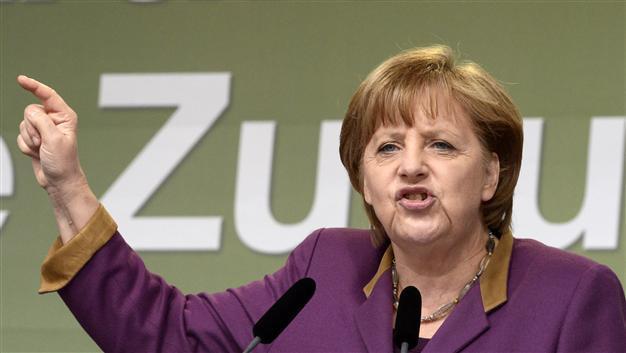Ukraine warns Berlin against 'Cold War' Euro boycott
KIEV - Agence France-Presse

REUTERS Photo
Ukraine Monday warned Germany against "
Cold War" tactics after reports that German ministers could shun Euro 2012 football matches in protest at its treatment of jailed ex-premier Yulia Tymoshenko.
Tensions between
Berlin and Kiev over Tymoshenko reached new heights last week -- just over a month before Euro 2012 kicks off -- with the opposition leader going on hunger strike and alleging she was beaten by prison guards.
German President Joachim Gauck has rejected an invitation to a summit meeting in Ukraine while the German media said Chancellor Angela Merkel was considering ordering ministers not to attend matches at the championships.
"We would not like to think that the political leaders of Germany are capable of reviving the methods of the Cold War and making sport a hostage of politics," foreign ministry spokesman Oleg Voloshyn told the Interfax-Ukraine news agency.
"We would like to think we are just talking about a false media report here," he added.
The Financial Times Deutschland reported on Thursday that aides to Merkel had told Ukrainian government representatives that the chancellor had threatened to skip the event over the Tymoshenko case.
German officials confirmed the meeting but did not disclose what was discussed.
And Der Spiegel reported on Sunday that Merkel was considering boycotting all matches in Ukraine involving the German national team and expected her ministers to do the same.
Pressure on Kiev mounted on Monday when the spokesman for the European Commission president said Jose Manuel Barroso had "no intention" of travelling to Ukraine or taking part in events there.
Germany has been one of Ukraine's biggest critics for its trial and convictions of Tymoshenko and several of her cabinet ministers on controversial charges that her supporters see as a part of a vendetta campaign.
The president of Germany's best-known football side Bayern Munich, Uli Hoeness, told Der Spiegel that it was up to UEFA chief Michel Platini to raise Tymoshenko's case with the Ukrainian authorities.
Ukraine is jointly hosting the biggest event in in post-Soviet history with Poland and had hoped to use the chance to showcase a nation of around 46 million people that dreams of closer European integration.
But Tymoshenko's trial and subsequent seven-year jailing for abuse of office charges relating to a gas deal she brokered with Russia have cast a long shadow just weeks before the first game is played in Warsaw on June 8.
Concern over Tymoshenko escalated last week after she launched a hunger strike to protest a beating she allegedly received during her forced move to a state hospital on April 20.
Tymoshenko's supporters released photographs showing two large bruises on the opposition leader's abdomen that they said confirmed the claims.
The prison service on Sunday said Tymoshenko developed bruises periodically since her initially August arrest and often "complained of haematomas." But a top prosecutor's office official told local television late Sunday that doctors believe the bruises developed after Tymoshenko herself "bumped into a blunt hard object." "This could not have been a punch with a fist," Vadim Goran told Channel 5 television.
